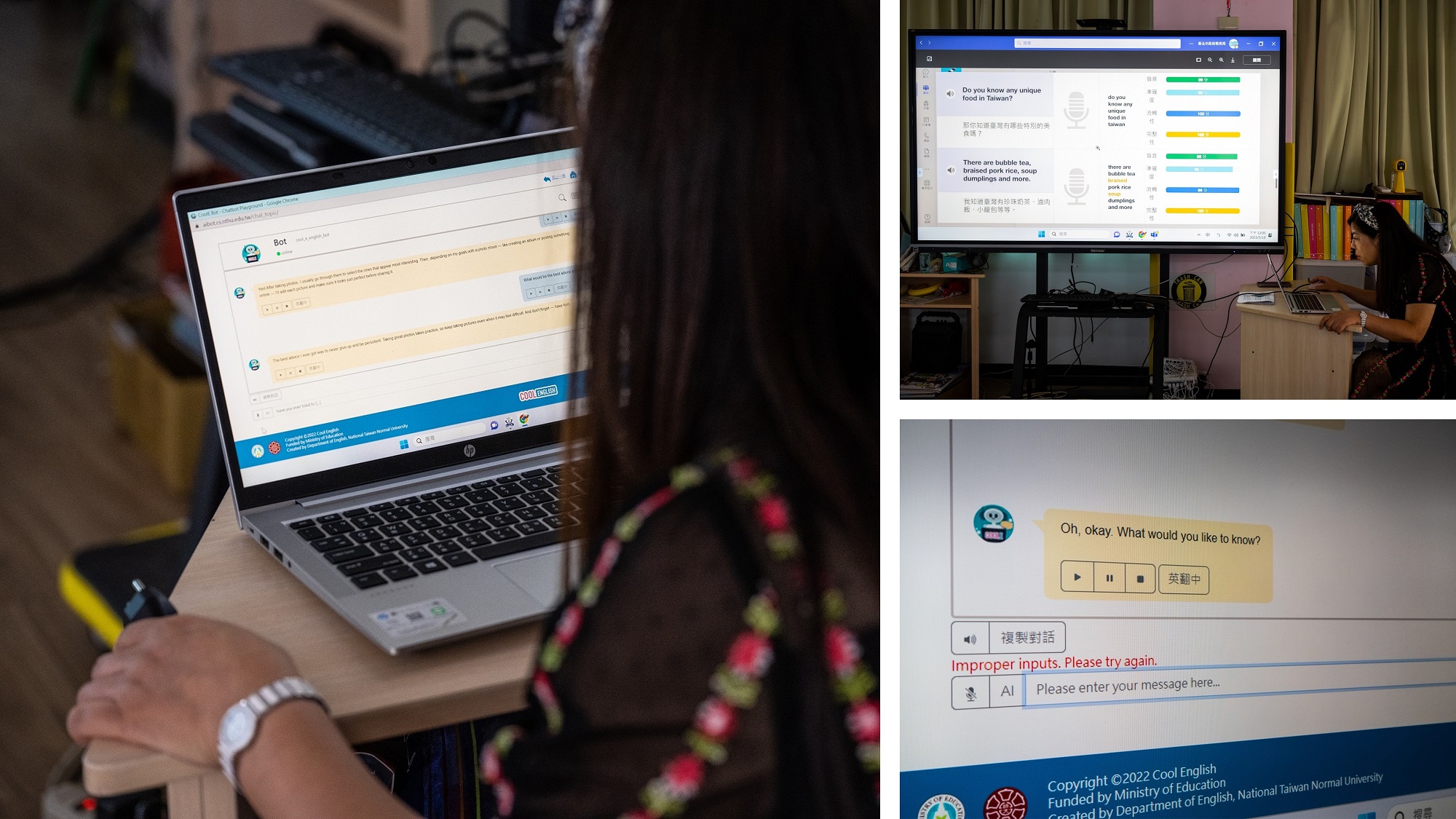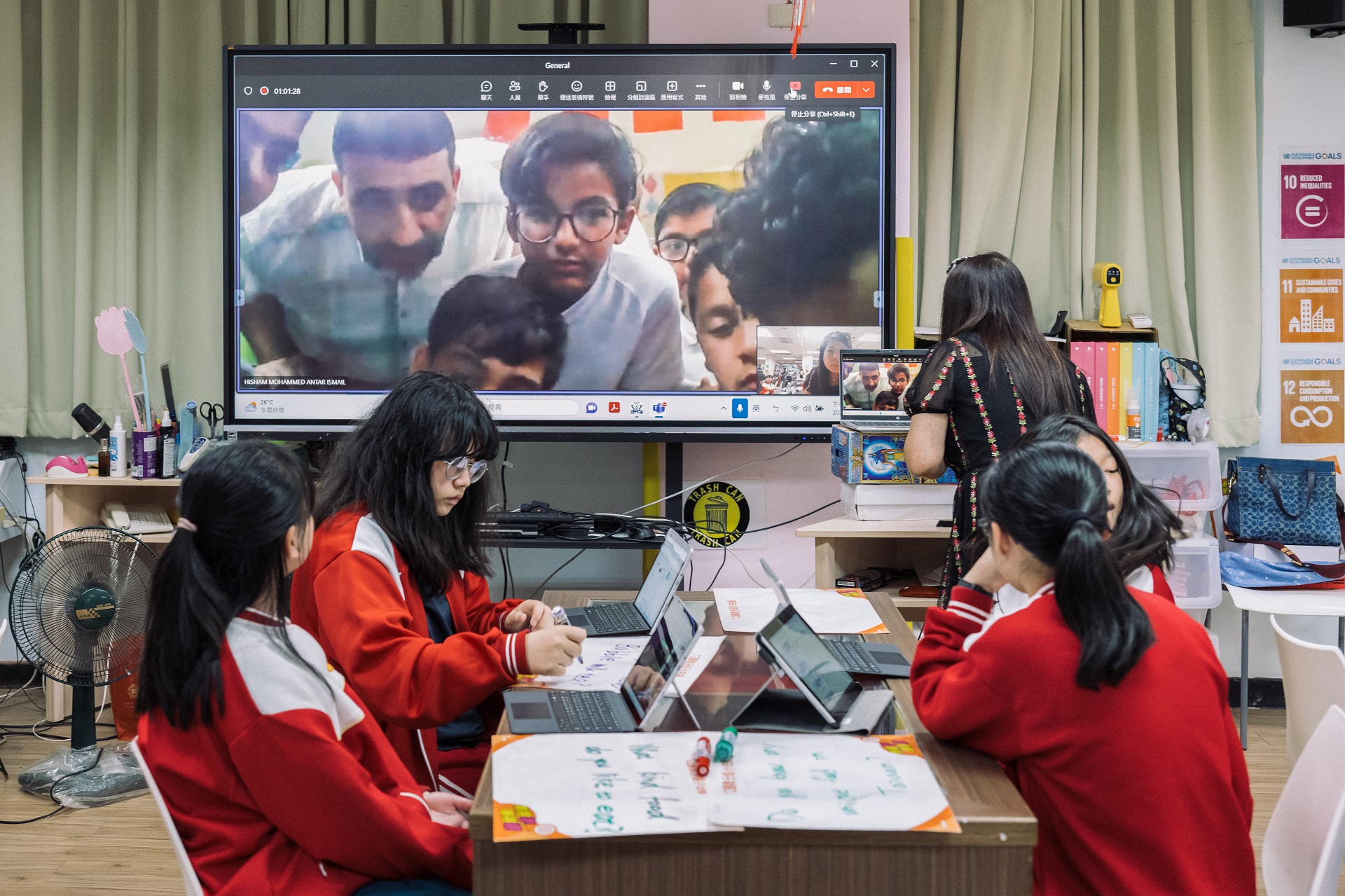[ad_1]
New Taipei Metropolis, TAIWAN – Lecturers usually report that college students studying English are inclined to learn and write higher than they converse, as shyness and an absence of follow can hinder the power to converse. Now, a chatbot funded by Taiwan’s Ministry of Training and working on next-generation massive language fashions provides a means for Ok-12 college students to get that follow, and in a extra participating means than was beforehand attainable.
The youngsters in Claire Mei Ling Wu’s English class at Er Chong Junior Excessive Faculty in Sanchong District, New Taipei Metropolis, started utilizing the CoolE Bot quickly after it was launched in late December.
Wu has been instructing English for over 25 years. Her classroom is adorned with a world map and nationwide flags. There are containers of knickknacks – items from pen buddies in Japan, India and as far-off because the U.S. state of Alaska.
“Generally when they’re shy, they don’t dare to talk up,” Wu stated. Nonetheless, if they will stay at their desks and converse “person-to-AI,” Wu stated, they’re extra comfy than coming to the entrance of the category or standing in entrance of the trainer.
With the chatbot, which makes use of Azure OpenAI Service and different Microsoft AI applied sciences, college students can decide one among many preset dialog subjects – asking a health care provider or photographer about their work, for instance, or role-playing as a detective to resolve a thriller – and off they go. Whereas older chatbots may solely present solutions that have been preloaded into the system, next-gen AI can generate responses by itself.
The chatbot may assess pronunciation, accuracy and fluency, and college students can follow as many occasions as they like to boost their rating.
If they’re stumped, they will click on on the “AI” button and the chatbot will recommend a query to maintain the dialog flowing. A content material filter retains issues from veering into inappropriate territory. If a scholar sorts or says a swear phrase, or one thing sexual, the chatbot solutions in purple sort: “Improper enter. Please attempt once more.”

“It’s attention-grabbing, and I can be taught English from it,” stated scholar Eva Zi Yu Huang, 13, eyes peeking out between lengthy black bangs and a blue surgical masks.
Taiwan has set a aim of changing into bilingual in Chinese language and English by 2030 as its economic system shifts from conventional manufacturing to extra knowledge or cloud pushed companies, the place the worldwide language tends to be English. There are regional aggressive pressures. For instance, Taiwan competes economically with locations like Hong Kong and Singapore, former British colonies the place English is broadly spoken.
“We wish to assist our college students rapidly improve their English expertise to compete with different international locations,” stated Howard Hao Jan Chen, an English professor at Nationwide Taiwan Regular College (NTNU).
In Taiwan, English courses are obligatory in public colleges for one or two hours per week beginning in third grade – with some colleges beginning as early as first grade, and that expands to as much as 4 hours per week in highschool.
That’s not a number of time to grasp a language with a complete completely different script, grammar and pronunciation. Frequent errors in English embody dropping articles, which don’t exist in Chinese language – omitting “a” or “the” – and mixing up of tenses. Apply helps, however it may be exhausting to seek out somebody to do this with once you’re surrounded by Chinese language audio system.
In 2015, Chen and his crew launched an internet site referred to as Cool English to assist Taiwan’s schoolkids be taught English utilizing expertise. The federal government-sponsored web site now has about 1.5 million registered customers from Taiwan and past.
“The way in which that academics educate is by studying books and listening to varied supplies by way of the Web. However the focus will not be on talking,” stated Scott Suen, a software program engineer on the Cool English crew. “Most Taiwanese college students can cross exams and get a really excessive rating, but when we’re put in a local English surroundings, now we have a tough time speaking with foreigners.”
To assist facilitate extra dialog follow, the crew constructed its first chatbot utilizing an older AI-based programming language.
“We rapidly discovered it very problematic,” stated Chen. “You need to sort in all of the attainable solutions for a query raised by college students – 1000’s of sentences to answer to college students intelligently. It’s not AI. It’s actually labor.”
Worse, he added: “We don’t know what sorts of questions college students wish to ask! College students gained’t wish to play with this type of foolish instrument.”
The challenge went dormant for some time. In 2022, the crew heard about next-generation massive language fashions. “We noticed, wow, that is actually one thing!” Chen stated. “It was very strong. The solutions are way more significant.”
The CoolE Bot, launched in December, sits on the Cool English web site. It makes use of superior language fashions as a part of Microsoft’s Azure OpenAI Service to have interaction college students in dialog a few set of eventualities. The language is adjustable for various ages and proficiency ranges.
The CoolE Bot makes use of Microsoft Azure Cognitive Service Speech capabilities together with text-to-speech and speech-to-text. College students can decide a number of voices with American or British accents. And Azure offers the information safety that’s notably essential when expertise is used on this setting.
“It’s a closed loop Azure subscription,” stated Sean Pien, normal supervisor of Microsoft Taiwan. “All dialog, finetuning and supplies are inside this safe area.”
Up to now, about 30,000 college students a month are at present utilizing the chatbot, racking up a complete of 1 million conversations a month.
The crew is now engaged on enhancements, together with including avatars and new eventualities for conversations. Sooner or later, as extra superior fashions can be found, the instrument will even be capable to right errors, Chen stated.
Lately, Wu’s class used the chatbot to arrange for a video name with counterparts in Bahrain, the place the aim was to follow English and study one another.

In the course of the name, the Taiwanese children tackled some large phrases with ease.
“The Nationwide Palace Museum has about 700,000 items of Chinese language imperial artworks, making it one of many largest collections on the earth,” stated Eva, the seventh grader, in entrance of her class in addition to the Bahrain college students onscreen.
“The Longshan Temple in Taipei is a spiritual, political and navy middle in Taipei Metropolis and has turn into an attraction for overseas vacationers within the post-war interval,” a boy with spectacles named Frank Pan stated.
When one scholar stumbled over the phrase “reservoir,” a refrain of voices helped her out.
After the children performed a web-based quiz collectively, the Taiwanese college students have been excited to ask questions that they had written down for the Bahrain college students.
“Are there any deserts in your nation?”
“Is your faculty a boys’ faculty?”
“What sort of transportation do you may have in your nation?”
“Have you ever drunk bubble tea?”
And extra.
High picture: Eva Zi Yu Huang, 13, and fellow English college students in Taiwan compete in a web-based quiz with counterparts in Bahrain. Photograph by Billy H.C. Kwok for Microsoft.
[ad_2]
Source link



